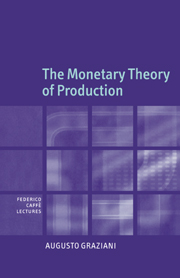Book contents
3 - A monetary economy
Published online by Cambridge University Press: 03 July 2009
Summary
The definition of a monetary economy
It seems proper to begin by defining what is meant respectively by a barter economy, a credit economy, and a monetary economy.
A barter economy
By a barter economy we mean an economy in which commodities are directly exchanged against other commodities. It should be immediately remarked that an exchange of commodities without any intermediation of money does not necessarily imply that the delivery of the two commodities being exchanged is simultaneous. In ancient times, it might be customary to borrow seed and to repay by delivering a given amount of wheat after the crop. This would be a case of an exchange assisted by credit in the framework of a barter economy.
A step forward is the case of an economy using one single commodity, for instance gold, as a general intermediary of exchange and as a unit of measurement of prices. In this case, the economy is using a commodity money. However, it still falls in the category of a barter economy, since the commodity money is privately produced along with all other commodities. Of course a similar economy would be technically more advanced compared with the more primitive cases of economies in which single commodities are directly exchanged one against the other.
A barter economy can be an economy of direct producers, where no wage labour is present (the case of slave labour is of course totally different).
- Type
- Chapter
- Information
- The Monetary Theory of Production , pp. 58 - 81Publisher: Cambridge University PressPrint publication year: 2003



